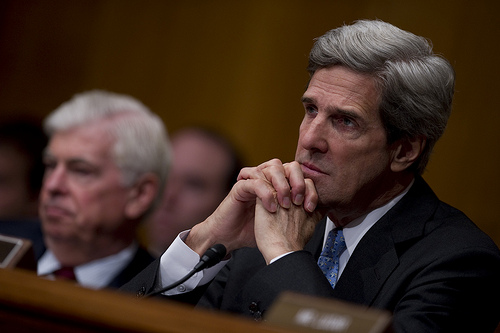
 I attended a Senate Foreign Relations Committee hearing Tuesday during which Committee members discussed civilian and governance issues in Afghanistan, a problem that has taken on an increasing profile recently on the Hill. Much of this attention can be attributed to controversial changes to President Karzai’s government and House Appropriations Subcommittee on State-Foreign Operations Chairwoman Nita Lowey’s decision to hold $3.9 billion in FY 2011 aid money to Afghanistan pending a series of oversight hearings on corruption and graft issues.
I attended a Senate Foreign Relations Committee hearing Tuesday during which Committee members discussed civilian and governance issues in Afghanistan, a problem that has taken on an increasing profile recently on the Hill. Much of this attention can be attributed to controversial changes to President Karzai’s government and House Appropriations Subcommittee on State-Foreign Operations Chairwoman Nita Lowey’s decision to hold $3.9 billion in FY 2011 aid money to Afghanistan pending a series of oversight hearings on corruption and graft issues.
Committee Chairman John Kerry noted in his opening statement that one in three Afghan families report having to bribe officials to obtain public services and that the U.S. government was spending $4.4 billion to support civilian efforts in FY 2010. “But all of these billions of dollars, and all of the sacrifices by our troops, will be irrelevant if the United States and our partners do not have a serious strategy to establish effective Afghan governance,” he said. Kerry also briefly discussed a soon-to-be released report from the Committee on corruption, which will set out recommendations about how to improve the efficacy of anti-corruption efforts.
Ranking Member Richard Lugar agreed with Kerry and remarked on the “lack of clarity” on a definition of success, even as the definition has been narrowed by the Obama Administration.
Special Representative Richard Holbrooke was the sole person to testify, and said he shared the Committee’s concern about rampant corruption in Afghanistan’s government. Addressing the issue about how much US aid money is provided directly to the Afghan government rather than U.S. government agencies or NGO’s, Holbrooke noted that the amount of money provided to the Afghan government was in the “high teens” with an aim to increase that number year-by-year as the capacity of the government increases, without sacrificing accountability.
Holbrooke highlighted the next week’s Kabul Conference, which will start on July 20 and is a follow-up to the January London Conference. The U.S. delegation will be led by Secretary of State Hillary Clinton and will, according to Holbrooke, send a signal that the U.S. supports civilian governance and close civilian-military cooperation. Holbrooke observed that the conference will be the largest foreign gathering in Afghanistan since the 1970s.
Stuart Baimel is a Government Relations Associate with the USGLC
Photo Credit: Joint Chiefs of Staff